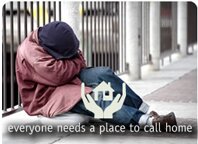Mentally distressed
The first Canadian study on homeless veterans has cast a spotlight on the plight of soldiers battling mental illness and addictions,many of them middle-aged men who end up living on the streets decades after they have been discharged from the military. The study by researchers at the University of Western Ontario interviewed 32 homeless veterans in London,Ont.,and Toronto,but researchers say they’re likely only a small portion of the veterans living on the streets across Canada.
The average age of a homeless veteran was 52,although researchers said they had found veterans as young as 30 and as old as 87. The average spent six years on the streets,although that ranged from as little as six months to as high as 32 years. Many,the study found,started drinking in the military and later became alcoholics. Few said they were offered or sought help from Veterans Affairs for their mental illnesses or addictions.
Among the study’s most surprising findings is that many of those who developed mental illnesses,such as posttraumatic stress disorder,never served overseas. That could be because governments of the day had a mistaken belief that only soldiers who served on foreign tours were at risk of developing mental illnesses and so didn’t offer support to those who served in the military at home,said Susan Ray,an assistant nursing professor at University of Western Ontario.
Many of the veterans living on the street blamed Veterans Affairs for not identifying early symptoms of mental illness,although they often didn’t ask for help,the study found. Traditionally,the military didn’t offer mental-health services to discharged soldiers unless they re-enlisted,and many didn’t want to go back into the military,said Jonathan Vance,a University of Western Ontario military historian.
Even today as services for veterans have improved,many are too proud to seek help,Mr. Vance said. It’s “a man thing,”he said. “There is a certain gender characterization there.”Few veterans want to talk about their struggles with illness,addiction and poverty,said Dennis Holmes,of the Royal Canadian Legion branch in Windsor,who helped gather winter hats and scarves for 100 homeless veterans in Toronto.
“A lot of homeless veterans are not willing to tell you that they’re veterans or willing to accept the fact that they’re in need,”said Mr. Holmes,who spent 12 years in the navy. “I think it’s because of the devastation it has caused them. It’s personal. Not a lot of people think it should be brought to light.”Minister of Veterans Affairs Jean-Pierre Blackburn praised the study for casting light on the problem. “It is very challenging to find and help homeless veterans,especially as many of them have been dealing with problems that are rooted in years of mistrust or disappointment,”he said in a statement. “We have a duty to continue our work and think outside the box to find solutions.”
Wed J
National Post,January 5,2011

